Professor Lauryn Gouldin, the Laura J. & L. Douglas Meredith Professor of Teaching Excellence 2022-2025, will present a draft of her upcoming paper Crime-Specific Searches at the December 12 Markelloquium. The Markelloquium aims for a colloquium-style in-depth discussion of works in progress in the field of criminal law and procedure.
Criminal Law and Policy
Criminal Law, Procedure, and Policy Speaker Series (2025-26)
This year’s Criminal Law & Policy Speaker Series connects students with top legal minds — from scholars to practitioners — tackling real-world challenges in criminal justice. It’s a chance to hear, question, and engage with those shaping the field. The series is organized by Associate Dean for Faculty Affairs Lauryn Gouldin with support from the Laura J. and L. Douglas Meredith Professorship Program, with many events hosted in partnership with the Criminal Law Society.
| Presentation | Speaker and Date |
| The Role of a Prosecutor | The Honorable Margaret Garnett, U.S. District Court Judge for the Southern District of New York August 20, 2025 |
| Representing Police Officers in Section 1983 Litigation | Syracuse University College of Law Professor Katherine Macfarlane September 3, 2025 |
| Representing Adolescents | Alan Rosenthal L’74, Veteran criminal defense and civil rights attorney September 22, 2025 |
| A Firsthand Account of the Challenges of Reentry: “Welcome Home from Prison, This Won’t Be Easy” | The Honorable Mitchell Katz, U.S. Magistrate Judge for the Northern District of New York, in Conversation with Dewayne Comer September 29, 2025 |
| Reforming Sixth Amendment Rights | Lisa Bailey Vavonese, Director, Research-Practice Strategies, and Matt Watkins, Senior Media & Policy Advisor, Center for Justice Innovation October 6, 2025 |
| The Value of Holistic Criminal Defense | Piyali Basak, Managing Director at Neighborhood Defender Service of Harlem October 15, 2025 |
| Supreme Court Preview – Criminal Cases | Lisa Peebles L’92, Federal Public Defender for the Northern District of New York October 17, 2025 |
| Networked Information Technology in Criminal Law | Professor Jessica Eaglin, Cornell University School of Law November 5, 2025 |
| Prior conviction impeachment: what is it, why is it harmful, and might it be abolished? | Professor Anna Roberts, Dean’s Research Scholar, Brooklyn Law School November 10, 2025 |
| Criminal Law Society’s Forensic Series, in partnership with Onondaga County Forensic Laboratories and Syracuse University’s Forensic and National Security Sciences Institute, features sessions on Biology & DNA; Firearms & Latent Prints; and Drug Chemistry, Arson, & Digital Evidence | January 29 ( Biology & DNA), February 12 (Firearms & Latent Prints), and February 26 (Drug Chemistry, Arson, & Digital Evidence) |
| Civil Rights Lawyering and Propaganda in a Time of Rising Authoritarianism | Alec Karakatsanis, Founder and Executive Director, Civil Rights Corps and Author of Usual Cruelty and Copaganda February 18, 2026 |
| Shielded: How the Police Became Untouchable | Professor Joanna Schwartz, UCLA School of Law April 16, 2026 |
Professor Gregory Germain Discusses Public Comments Made in the Luigi Mangione Murder Trial
Professor of Law Gregory Germain spoke with The Guardian for the story “Judge cautions prosecutors in healthcare exec murder trial to refrain from public comments.” The Judge in Luigi Mangione’s murder trial recently pointed prosecutors to a district court policy barring lawyers on both sides from making “public commentary that could impede Mr. Mangione’s right to a fair trial”.
It is hard to say exactly when out-of-court statements by public figures might have an impact.
“The rules are vague enough that it’s hard to know when they cross the line,” said Germain.
“What the judge did is what judges usually do if they think they’re getting close to the line: they admonish them and remind them of their obligation,” he said. “They hope then that the prosecutors will behave themselves and not try the case in front of the public, but try the case in the court and not impair the defendant’s right to a fair trial.”
Professor Lauryn Gouldin to Present on Pretrial Appearance and Criminal Court Scheduling Practices at the National Conference of Bar Examiners Annual Bar Admissions Conference
Professor Lauryn Gouldin will present her research on pretrial appearance and criminal court scheduling practices at the National Conference of Bar Examiners Annual Bar Admissions Conference. She will participate on Friday’s panel “Remote Courts 2.0: Building Sustainable Hybrid Justice Systems”. The panel will be moderated by Chief Justice Mary Russell of the Supreme Court of Missouri.
Professor Gregory Germain Discusses Luigi Mangione’s Not Guilty Plea
Professor Gregory Germain recently spoke with The Guardian about Luigi Mangione’s plea of not guilty in his murder case.
Germain previously told the Guardian that nearly all recent federal death penalty cases took place during Trump’s first term.
Germain said he believed that Trump’s justice department would not agree to a deal in which Mangione pleaded guilty in exchange for a life sentence.
“He has political reasons, wanting to seem ‘tough on crime’ by supporting the death penalty,” Germain said.
Stolen at Birth, Syracuse Law Alumnus Makes It His Life’s Work to Bring Justice to Families of Counterfeit Chilean Adoptions
On Oct. 31, 1980, a baby boy was born in Santiago, Chile, to a poor, young, Indigenous mother. He was whisked away before she was allowed to hold him, and later she was told that the baby had died. But, he was very much alive, taken away by a ring of traffickers who created fraudulent documents and sold him into international adoption. It would be decades before Jimmy L. Thyden González L’21, would discover the circumstances surrounding his birth and use his knowledge of the law to fight for the rights of thousands of other counterfeit adoptees around the world.
Amazingly, Thyden González’s story is not unique. Tens of thousands of babies had been victims of a scheme under Chile’s then dictator Augusto Pinochet, who believed that kidnapping the children of poor, Indigenous and often single women was a way to reduce the country’s poverty rate and improve economic conditions. His twisted rationale meant that the Chilean government would not have to support as many poor families, and, in turn, it would create an economic boom through fees paid by unwitting adoptive parents throughout Europe and North America. Corrupt doctors, judges, government officials and clergy were an integral part of running this horrific system of child trafficking, which, according to the Chilean government, took approximately 20,000 children away from their parents between the 1950s and 1990s. However, it is estimated by civil and nonprofit groups working to address the harms that the actual number is closer to 50,000.
Thyden González was adopted from a Chilean orphanage at age 2 by an American couple who had no idea that the child’s papers and backstory were fraudulent. They believed his birth mother had willingly given him up, being too young and poor to care for her baby. His paperwork called him “Carlos,” but the couple named him James “Jimmy” Thyden, and he had a happy childhood growing up in Virginia.
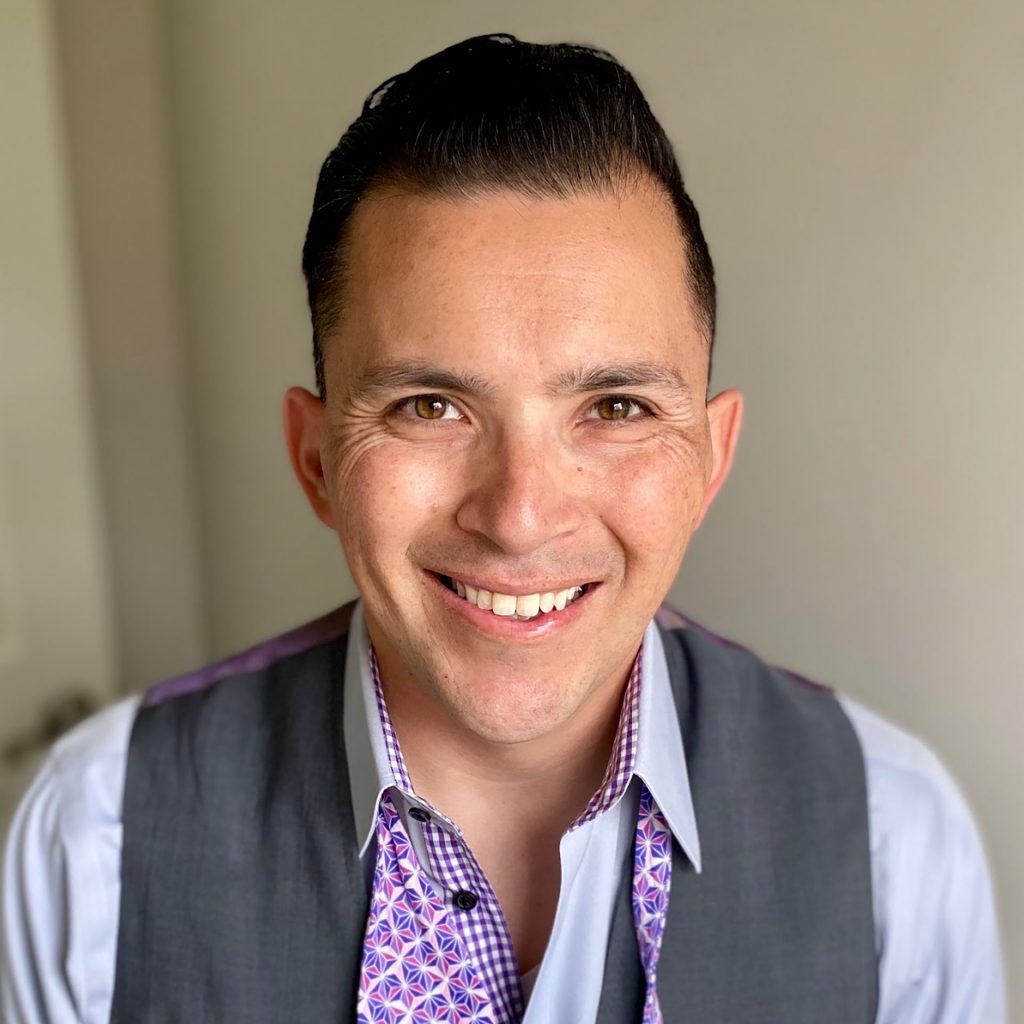
Taking A Closer Look at his Adoption Story
After high school, Thyden González joined the U.S. Marine Corps, where he served for 19 years. In 2011, just before he was preparing to be deployed to Afghanistan, his adoptive mother gave him his adoption records. As Thyden González looked through them, he began to notice discrepancies. One, for example, said he had been born in a hospital in Chile to a “known mother.” Another said he had “no living family.” Papers also indicated that his mother’s name was Maria González, which, unfortunately, was a very common name in that country. At the time, he had no idea what the real story was, but he put those thoughts in the back of his mind as he headed off to Afghanistan.
Upon his return, he often thought about investigating his adoption story, but he wasn’t quite sure how to begin. Many in his adopted family told him he was loved and that he should be grateful for the life he had been given, but he continued to feel a question that needed answering. Thyden González thought about traveling to Chile to research his background, but that required permission from the military and finances In addition, he spoke no Spanish and knew little of the culture.
Thyden González separated from the Marines in 2018 and earned an undergraduate degree from Liberty University, and then used the G.I. Bill and Syracuse’s commitment to the Yellow Ribbon Program to earn a law degree from the Syracuse University College of Law with the intention of being a criminal defense lawyer fighting the disparities toward people of color within the criminal justice system.
Making Connections to Find his Chilean Family
In 2023, his wife came across an article about a man who had been the victim of illegal adoption in Chile. The story felt very familiar to Thyden González, and he decided the time had come to find out more about the circumstances surrounding his birth and adoption. Notably within the article was mention of a nonprofit organization in Chile, Nos Buscamos, working to reunite families. An organization which he describes as “two ladies working with their laptops to change the world.”
Thyden González got in contact with them, eventually sending copies of his paperwork— and quickly learning that the attorney and social worker who had handled his adoption were some of the most notorious traffickers in Chile. He was advised to submit his DNA to MyHeritage, which had been supplying DNA kits to women in Chile in the hopes of finding some of the trafficked children. As a lawyer, he was hesitant at first, but, knowing there was the possibility of reuniting with his family, he finally decided to do so. Just 42 days later, the DNA results connected him with a woman from Chile identified as his mother’s cousin. He emailed the woman, who was herself skeptical but did tell him that there was a Maria González in her family and that she was alive.
Soon, he received a message from his aunt saying, “We found her, and she wants to meet you.” It was only after that that Thyden González first heard the true story of what had happened to him and his mamá on the day he was born, and how, since that day, she believed her son had died. Soon, he was frequently texting with his mamá in his “terrible Spanish,” as he raised the money to travel to Chile.
At the same time, González got in contact with other Chilean’s who had been illegally adopted, one of whom, Adrian Reamey, was making a documentary about the issue and wanted his legal expertise. She asked him to accompany her to Chile as part of the documentary-making process. Finally, he had the opportunity to reunite with his mamá and meet his family!
Reuniting With his Mamá
The reunion was tearful and overwhelming, as he hugged his mamá for the first time, surrounded by other relatives who welcomed him joyously. Thyden González, his wife and children, were able to spend a week getting to know his mamá. Soon after, he officially added “González” to his name, making him Jimmy L. Thyden González in honor of his Chilean heritage.
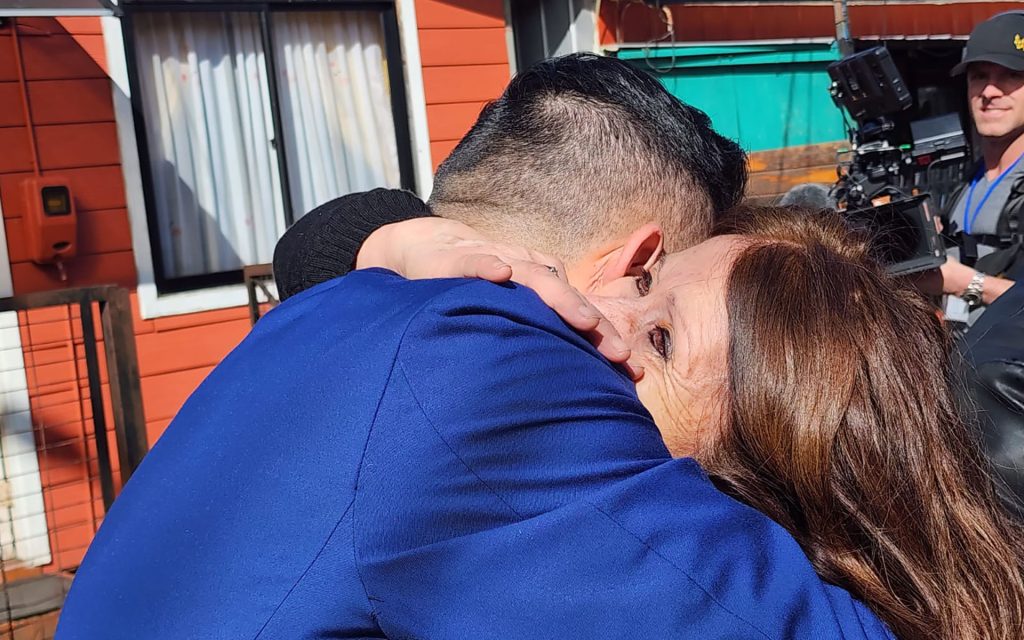
In the two weeks that followed, González stayed in Chile with the documentary film crew, meeting with government officials, where he learned that the Policia De Investigaciones De Chile (PDI), the civilian police department, had only five individuals in the entire country investigating illegal adoptions. No one was truly working to provide any kind of closure or reparations for the thousands of mamás and their stolen babies.
González returned to the U.S., put his law practice on hold and decided the best way he could help would be to get an LL.M. in international human rights, which he completed last year at American University’s Washington College of Law.
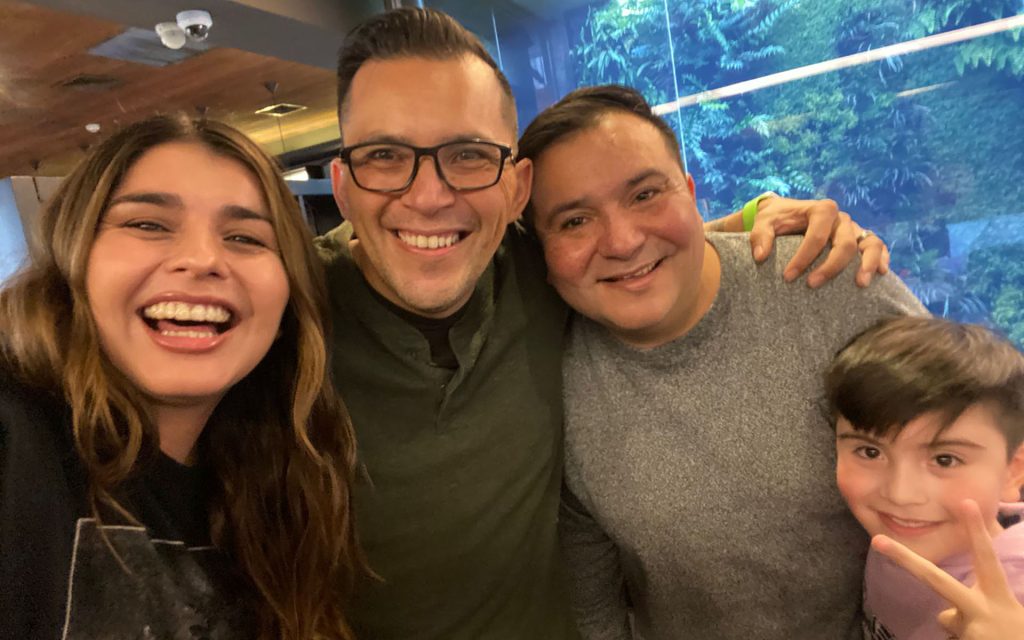
Creating a Nonprofit to Help Others Affected by Illegal Trafficking
At the same time, he created a nonprofit organization, Grafting Hope, to help those impacted by illegal human trafficking obtain reparations. The organization has already brought a great deal of awareness to these counterfeit adoptions, which, unfortunately, still continue at some level even today. Thyden González has met with officials in Chile and the U.S., making connections through both embassies. He also had the opportunity to brief the United Nations Committee on Enforced Disappearances, testifying on the atrocities of these illegal adoptions.
When he heard that the president of Chile, Gabriel Boric Font, planned a visit to the U.S., Thyden González started a grassroots effort through a group chat with other impacted adoptees asking them to come to Washington, D.C. Thyden González collected many of their stories with Nos Buscamos and Reamey and presented them to Boric, telling him, “These are our stories, and we need your help. We, too, are Chilean.”
Thyden González has since been working non-stop to make those impacted families whole again. In addition to Grafting Hope, he is collaborating with Chilean law firm Colombara Estategia Legal. Together he sued the Chilean government, fighting for reparations on the basis that it failed to protect these babies and their mothers, thereby violating their human rights. He has filed suit asking the Chilean government to acknowledge the harm caused and establish a commission to identify all victims, both mamás and children, as well as recognize the identity and citizenship of those stolen babies and their descendants. Thyden González himself cannot claim Chilean citizenship under his chosen identity since the name on his adoption papers was fraudulent. He also walks a fine line because unwinding his adoption might nullify his American citizenship with the chance that this retired, disabled U.S. Marine could be deported. But, if he can’t clarify his adoption and be cleared as an American citizen, it will be nearly impossible for him to bring his mamá and family to the U.S. to care for them.
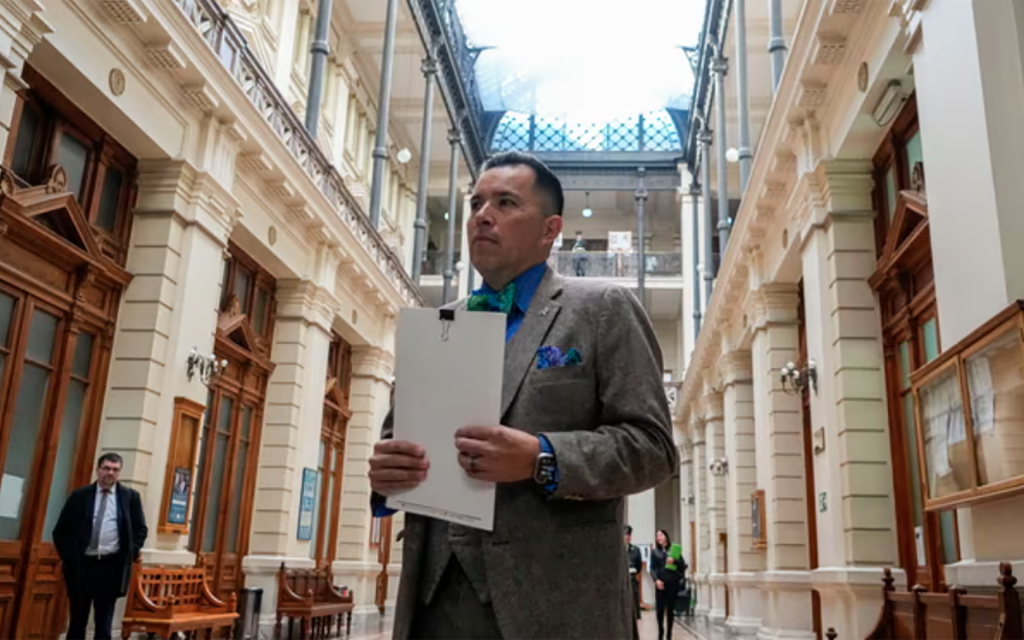
Continuing to Create Awareness
Still, every day, he continues the fight, and his improved Spanish language skills have made it easier to keep in touch with his mamá. Thyden González recently published an op-ed in The New York Times telling his story and has been using various media outlets to continue to raise awareness of counterfeit adoption. Last November, he also shared his experience with students at Syracuse Law.
“It is not lost on me that I came to Syracuse Law to study criminal defense and was, in fact, the victim of a crime from the day I was born,” he says. “I intend to continue to advocate and fight, not only for myself and my mamá, but for every mamá out there who lost a child to this horrendous counterfeit adoption scheme. It has become my passion, and the center of my identity and my career. I don’t intend to stop until there is a resolution, but I also know it’s going to take time. Still, I hope to see that day come soon.”
Professor Gregory Germain on the Death Penalty in the Luigi Mangione Trial
Professor of Law Gregory Germain spoke with The Guardian for an article on the Department of Justice seeking the death penalty in the Luigi Mangione trial.
Germain said the death penalty raises the stakes and adds “pressure” on Mangione to accept a life sentence if such a plea deal were offered.
German noted, however, that almost all the recent death penalty cases unfolded under Trump’s first term and surmised that his justice department would not agree to a deal for life imprisonment.
“He has political reasons, wanting to seem ‘tough on crime’ by supporting the death penalty,” Germain said.
Youth Law Day Brings 200 High School Students to the College of Law
The College of Law’s annual Youth Law Day event recently brought more than 200 high school students from schools across Central New York to Dineen Hall for an introduction to the legal profession, learning about the role of attorneys in society, and how to chart a path to law school. The theme of the day was “Science and Technology in Law.”
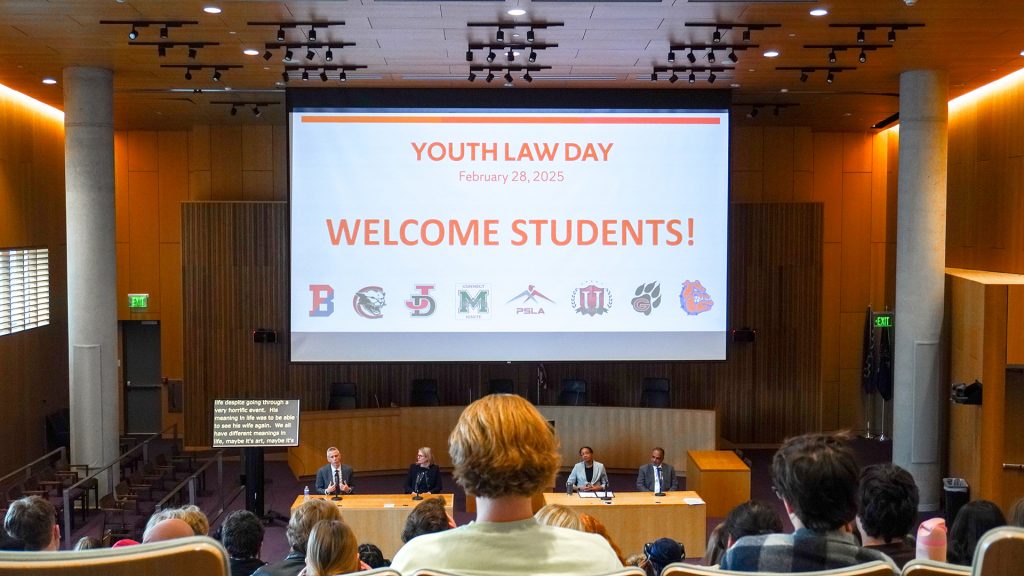
Participating schools were Binghamton High School, Corcoran High School, the Public Service Leadership Academy at Fowler High School, Geneva High School, Jamesville-DeWitt High School, Marcellus High School, Nottingham High School, and Utica Proctor High School. This year’s program was coordinated by Professor Lauryn Gouldin, co-founder of the Syracuse Civics Initiative.
The welcome address of the day was delivered by the Hon. Brenda K. Sannes, Chief United States District Judge for the Northern District of New York. Students then heard from a panel of judges that featured the Hon. Anthony Brindisi, the Hon. Beth Coombe, the Hon. Ramón E. Rivera L’94, and the Hon. Staci Dennis Taylor L’14. Professor Nina Brown of the Newhouse School of Public Communications then lectured on Ownership and AI.
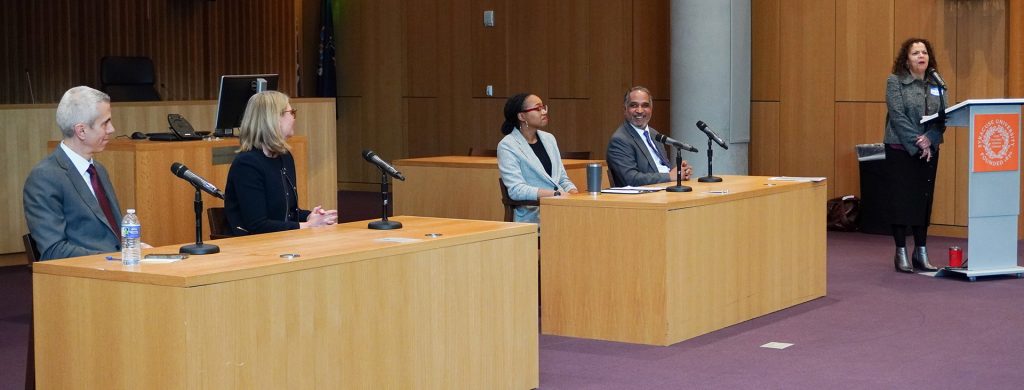
Before lunch, the students broke into groups to tackle a mock oral argument activity. This activity was led by current law students who gave them advice and feedback about oral argument and modeled the activity for them. While at lunch, students were able to network with faculty, alumni, and current law students.
Students then heard from a college admissions counselor who answered their questions about applying to law school, followed by a lecture called “The Life of a Criminal Case” by Gabriela Girona Wolfe L’16, Assistant Public Defender from the Northern District of New York.
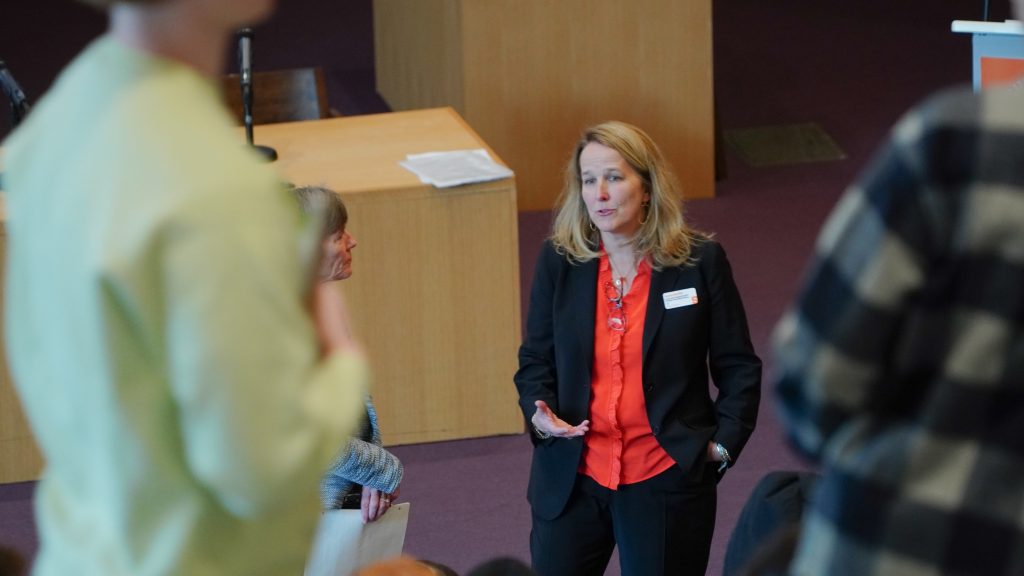
The visiting students were then able to ask a panel of current Syracuse Law students about their path to law school, how to prepare for the LSAT, good study and test-taking habits, and more. The panel was moderated by 3L Jesse Elmer and featured 2L Jocelyn Anctil, 3L James Cameron, and 2L Jared Park.
Kimberly Wolf Price L’03, Chief Strategy & Diversity Officer at Bond, Schoeneck & King PLLC, provided closing remarks.
Event sponsors were:
Syracuse University College of Law
Barclay Damon
Bond, Schoeneck & King, PLLC Law Firm
Bousquet Holstein
The Hon. Robert A. Katzmann Justice for All: Courts and the Community Initiative
Lexis Nexis
New York State Bar Association
The Onondaga County Bar Association
Syracuse Civics Initiative
Syracuse Student Bar Association
The Wladis Law Firm
Travis H.D. Lewin Advocacy Honor Society
United States District Court for the Northern District of New York
Criminal Defense Attorney Establishes Practice to Further Trial Experience, Fulfill Essential Function of the Law
“The stakes are never higher than when someone’s liberty hangs in the balance,” says John J. Dowling III L’20 of why he chose to become a criminal defense attorney.
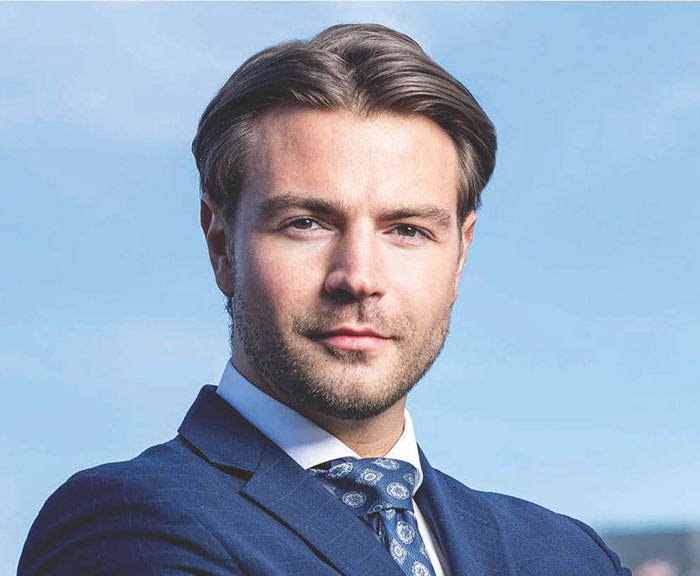
Dowling started his criminal defense practice, Dowling Defense Group LLC, in 2021 in Charlotte, North Carolina. After graduating from Syracuse University College of Law, he had opportunities to join larger organizations that would have initially been more lucrative, but he decided to blaze his own trail to gain trial experience as quickly as possible.
“It’s difficult to generate trial experience right out of law school. If you work for a big firm, it’s going to be a long time before you get to try a case in front of a jury,” he explains. “So I went another way and opened a law firm by myself, and it’s amazing. I’m so glad I did it, as I’ve already tried a number of cases and argued two cases in the U.S. Court of Appeals.”
Dowling believes that the advent of the plea bargain—which didn’t always exist—has resulted in less trial experience for attorneys. “Trial by jury pre-dates the American Revolution, and I don’t think plea deals are how the framers of the Constitution thought this is how it would go,” he says. “A jury trial is the spinal column of the criminal justice system, but it’s used less and less because the risks of going before a jury can be higher.”
His focus on federal criminal law is not often a common choice, but he likes the challenge of going up against the federal government, including the FBI, Secret Service, or IRS.
“It’s a huge process when the federal government comes at you with all its forces,” he says. “But, Syracuse Law set me up to be an effective criminal lawyer, and now I’m using those skills to help others.”
Dowling is thankful for the education he received at Syracuse Law, calling it “one of the best in the country” and noting the experience he gained in various legal externships, as well as Trial Practice, Trial Advocacy and Moot Court. He points to Associate Dean for Online Education and Teaching Professor Shannon Gardner as someone who had a big impact on him as she demonstrated excellence and professionalism within the law.
His law school education also cemented his beliefs that criminal defense attorneys are an essential function of the law. “Everyone deserves a defense,” Dowling says. “Whether someone is guilty or innocent, things need to be handled the right way, and rules need to be abided by in order for a fair system to exist.”
Many of his cases are considered white collar crimes, which come with complex questions and interpretations of the law. “Clients can get themselves into situations that weren’t nefarious, but the consequences can be devastating to their lives, marriages, finances, etc. And, whether or not the government can show proof beyond a reasonable doubt is not as cut and dried as people think,” Dowling says.
“White collar crimes can often be harder to figure out and more nuanced than violent crimes, but they still have devastating penalties,” he adds. “There are many people who are falsely accused or overcharged, not because prosecutors are corrupt but because a witness might be lying, evidence is presented in a certain way, or the government has taken shortcuts. Often, it’s the consequences of misunderstandings that put people in prison.”
He is pleased with the path he chose and finds his job as a defense attorney fascinating, interviewing witnesses, doing research, and demonstrating his knowledge of the law in front of juries, all in an effort to make sure his clients get a fair trial.
Dowling acknowledges there are a few cases he won’t take, but, he says, “I don’t struggle with what clients are accused of doing because I recognize that all people have rights. I’m not here to agree or disagree. I’m here to serve an essential function of the American legal system.”
College of Law Faculty, Students, and Alumni Write Guest Opinion “Automatically handcuffing people during police stops violates the Constitution”
In response to an incident where Syracuse City Police handcuffed an 11-year-old girl during questioning. College of Law faculty, students, and alumni wrote the Guest Opinion article “Automatically handcuffing people during police stops violates the Constitution” at Syracuse.com.
Contributors are Laura J. & L. Douglas Meredith Professor of Teaching Excellence and Crandall Melvin Professor of Law Lauryn Gouldin, director of the Syracuse Civics Initiative; Martin Feinman L’83 former director of Juvenile Justice Training for the Legal Aid Society of New York, Juvenile Rights Practice; Jocelyn Anctil G’25, L’25; Megan Hartman L’26, and Nicholas Marasco L’25.
They write: “Court decisions (and even police training manuals) from across the state and country make clear that automatically handcuffing people during stops is a violation of the Fourth Amendment. Although handcuffs may be used when specific, individualized safety or flight risks are alleged, the facts available from media reports and the video of the stop do not provide support for the use of handcuffs during the stop shown in that video.
Police might prefer to use handcuffs in an excess of caution. And, of course, police work involves important exercises of caution. But the Constitution requires that caution be balanced against the liberty and dignity of people — especially children — who interact with police. Excesses of caution are unconstitutional.”
